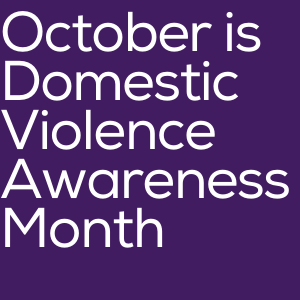Domestic Violence Prevention Is Suicide Prevention
Hanna H., University of Kansas Social Welfare Intern and KSPHQ Crisis Counselor
It is Domestic Violence Awareness month. As an advocate for victims/survivors as well as a counselor at HQ, I think it is important to understand how domestic violence can impact those who experience it. So, what does it mean to be a victim/survivor, and how does experiencing trauma impact mental health?
Domestic violence is defined as a pattern of controlling physical, sexual, and/or emotional abuse in a relationship. Domestic violence comes in many different forms and affects everyone differently. When a person experiences trauma, the chemicals that are released in their brain influences their perception, reaction, and memory. This is the body’s natural response and is not something that we can control. It does, however, have the power to change our brains and how we see the world for the rest of our lives. This, of course, has an impact on our mental health.
Trauma and exposure to violence flood our brains with a wave of chemicals and often times impacts our mental health in negative ways. This can lead to depression, anxiety, and PTSD. Research also shows that thoughts of suicide are reported more often in areas where individuals are also experiencing high rates of domestic violence. Preventing domestic violence and supporting victims/survivors who are experiencing domestic violence helps prevent suicide. So how do you help someone experiencing domestic violence and prevent it from happening in the future?
Know your local resources
Every county in Kansas has a domestic violence center that offers a variety of services that can help someone who is trying to escape a dangerous situation. They can offer help with protection orders, counseling, emergency shelter, and case management. If you are unsure where your domestic violence center is located start by calling/texting/online chatting with the National Domestic Violence Hotline at 800.799.SAFE (7233) or thehotline.org.
Support, Support, Support
The number one question I get when talking to someone who has a loved one in a violent relationship is “What can I say to them to help?” My response is to always support their choices, even the ones you do not agree with (and to use your best judgment if you feel they’re in immediate danger). As advocates, we know that the harder you push someone to leave the harder they will want to cling to their relationship. Their abuser is most likely trying to make them feel isolated so being harsh or using tough love only confirms what they are hearing from their abuser, “No one will support you or love you as I can.” Hold space for your loved one and let them know that you are there if or when they decide to leave.
Donate, Educate, Act
A large part of what makes it so difficult for victims/survivors to leave is the current legal barriers they face when navigating systems like housing, legal institutions, and childcare. These systems can be difficult to navigate, especially for someone who does not have an emotional support system such as family or friends to assist them. This is why domestic violence centers are crucial to getting victims/survivors safe.
Find your local center, check their website or social media pages, and see if the agency has a wish list of items. Often this will include things like basic hygiene products, clothing, bedding, and food. You can also donate your time by reaching out to see what kind of volunteer support your local agency might need. If your local domestic agency offers public education presentations invite them to speak at your workplace, event, or conference. And most importantly, vote for and support politicians that want to fund these services. Believe in healthcare, and want to make a difference for the vulnerable people in our communities.

